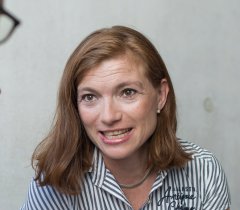
Prof. (FH) Dr. Claudia Van der Vorst
Vice Director of Studies Industrial Engineering
Prof. (FH) Dr. Claudia Van der Vorst is the Vice Director of Studies for the Industrial Engineering degree program. She has asserted herself in an industry that is dominated by men. An interview about women in technology in the past and today.
>> Claudia, you are the Vice Director of the Industrial Engineering degree program at the University of Applied Sciences Kufstein Tirol (FH Kufstein Tirol). Have you always been interested in technology?
Yes, that is why I chose the natural science track in the secondary school. I also wanted to become a baker, but my grandparents that I grew up with advised me not to do it when I received three offers after submitting three technical applications. I then decided for information electronics at IBM Deutschland GmbH, and in the first year of apprenticeship I learned mechanics, filing, lathing, milling, metalworking, and the basics of electronics.
>> Of those who were interested in a technical area, how many of you were women?
There were four women students out of 700 students in the metalworking technical professions at the trade school. I was a strange bird. My peers and the trainers were able to deal with it. However, companies had some reservations. “I thought I was getting an apprentice, and here comes a girl. What am I supposed to do with her?” – sentences like were often said. The women that I learned to know all finished quickly: whether it was school, their degree program, or their doctorate – in spite of a double load with children.
>> What was your situation like at your job?
Later in IT consulting at Accenture GmbH, where I worked for 17 years, everything was set up the American way: The wages, the promotions, and evaluations were equal and without discrimination. However, the gender issue was still a topic, and it was also pushed a lot as is typical for the Anglo-Saxon sphere. At international conferences, there was a women’s breakfast for example. I always felt like I was at a kids’ table. So, in my view, no greater equality was reached – it was the opposite instead.
>> How do you assess the situation today?
A woman in a technical profession stands out regardless of where she is. That has advantages and disadvantages. I always had the feeling that at the beginning you first had to prove yourself. However, if things went okay, then they went okay, and you were able to get a very good standing. By the way, there is also this phenomenon the other way around. Two men started working at the daycare where my children go, and at the beginning everyone paid attention to them. Today, more women work in technical areas than they used to. However, they are still a minority at under 20 percent. Unfortunately, that is also reflected in my courses. However, those that are interested in technology are mostly incredibly good.
>> How do you get women interested, and what can a university do to help?
Experience and having a positive association with the field make a huge difference. We have made events such as “Digital transformation that you can touch,” that captivate our visitors. We have also developed a vacation program for schoolchildren. During summer vacation, the children built a cableway with a motor and illumination, and they also worked with the 3-D printer. In this way, they have positive associations with the catchword technology. Math, physics, or chemistry tests, however, tend to scare a lot of them away. Topics such as programming appeal to a lot of people, and the omnipresent cell phone does the rest. A lot of people also have a greater idea about modern catchphrases like smart homes. If they want to open the window with their cell phone, then the window of course will need a motor.